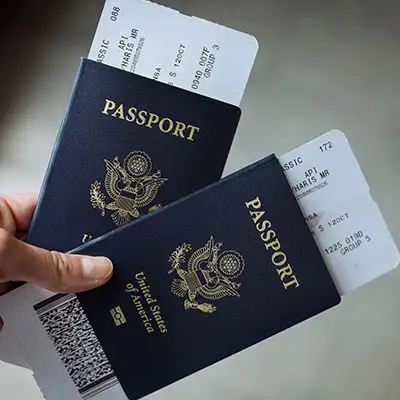You go online to plan and book your trip. You use your phone to take vacation pictures of the kids. You might even use your smart watch to pay for souvenirs.
Love it or not, technology has become ingrained in our travel experiences. While technology can sometimes get a bad rap for what it does to our ability to disconnect and relax on vacation, it can be used for good. It's time to explore five ways technology can help you be a more responsible traveler.
How to Be a Responsible Traveler with Technology
1. Research your destination and the companies that get you there.
When we’re figuring out how to travel more sustainably, research is key. They can be a little harder to uncover, but many travel suppliers pride themselves on their small carbon footprint and other eco-friendly practices. Supporting these businesses is a step we can take to be more environmentally friendly when we travel.
How do I know if a company is environmentally friendly?
- Examine the company’s website and look for specific steps they’re taking to be sustainable rather than a simple statement of being eco-friendly. You’re searching for evidence that they’re walking the walk, not just talking the talk. For example, if an inn says it’s reducing its carbon footprint, does it source locally grown food or have solar panels? If a site says it’s reducing waste, does it have recycling or compost bins?
- About 10% of the world’s carbon emissions come from the fashion industry. When shopping for clothes and toiletries to pack for your next trip, look for companies that use natural or recycled fabrics or items labeled “cruelty-free.”
- Some destinations are taking the extra step to protect their local environment. Key West has banned certain sunscreens made with chemicals that harm marine wildlife. Palau, an island nation in the Pacific, has a rewards program called Ol’au Palau that incentivizes tourists to treat the country “gently and respectfully.”
- Southwest Airlines partnered with Unshattered, a non-profit organization that employs women in recovery, to create Possibilities Take Flight. This collection of travel bags and accessories is made from upcycled leather from the airline’s plane seats.
Good research can also help ensure we’re having a positive impact on local communities when we travel. Want to stay at a Black-owned Airbnb? Going online is the best way to find it. What about exploring another culture in a culturally sensitive way? Online databases like NativeAmerica.Travel can help you locate tourism activities that showcase that culture in a respectful way. Want to eat at a family-owned restaurant? A search on social media, blogs, podcasts, or websites dedicated to that community can help you discover the local flavor you crave. Plus, you’re directly contributing to that community’s economy, something that might not happen if you stick to the chains and larger corporations.
Other ways we love how technology can help us research to be more responsible travelers:
- Connect with voluntourism opportunities at your destination.
- Find accessible and ADA-compliant businesses, whether you need additional aid to travel with a disability or you simply want to support the businesses that make it possible.
- Identify off-peak travel times, when destinations are less overwhelmed (and potentially damaged) by overtourism, and when their economies are in greater need of your tourist dollars.
- Learn local laws and customs that allow you to be more culturally sensitive in your travels.
2. Go paperless.
Banks have been telling us for years how opting into paperless statements is helping the environment. They’re not wrong. While one piece of paper per month for you might not sound like a lot, imagine one sheet each month for thousands, or even millions, of customers.
It’s the same when you use technology to go paperless when you travel. Instead of printing tickets, boarding passes, itineraries, health records, and other travel documents, save them to your phone (and the Cloud for backup) or download an app to store them all digitally.
Consider this scenario as an example of the impact going paperless can have. Like your bank statement, that slim boarding pass might not seem like much. It’s not even a full sheet of paper. But an international flight might have upwards of 400 passengers. Many passengers will have connecting flights, and most will at least have a return flight. If everyone on your plane used an electronic boarding pass, it could eliminate more than 1,000 pieces of paper, most of which end up in the trash in the baggage claim area, unrecycled. Multiply that by the number of flights each day, and that’s a significant environmental impact.
3. Take advantage of rideshare apps.
There are two ways rideshares can help travelers have a positive impact. First, the environmental. While it’s true that walking and public transportation have the lowest carbon emissions, rideshare services can help reduce the number of cars on the road. Mother Nature always appreciates that. Plus, some companies are doing their part to be even more environmentally friendly. Use Uber Green at your destination, and your ride will be in a hybrid or fully electric vehicle.
The second benefit of rideshare apps is the way it connects you to the community. When you pay for your ride, and when you tip, you’re putting money in your driver’s pocket, which can help contribute to the local economy. You can also get recommendations from your driver about what to see and do in the area.
On recent trips to Boston and San Antonio, my partner and I asked each of our Uber drivers where we should eat. Some had touristy recommendations, but others tipped us off to restaurants we never would have found on our own. And they were amazing! Not only did it make our travel experience richer, but we were also able to bring business to restaurants that typically got fewer tourist dollars. Everyone wins in that scenario.
4. Speak their language.
This one is all about connecting better with people. Let’s say that instead of traveling from Indianapolis to Boston, I’d come from another country and English wasn’t my first language. I might not have been able to ask for or understand those amazing recommendations from our drivers.
Having a translation app on your phone can help enrich your overall experience, learn more about what you’re eating and seeing, talk to locals, and stay safer. You might even use online classes to learn a new language before you go. We’re no longer bound by a classroom if we want to learn something new.
You don’t have to understand every word or be fluent in another language to enjoy exploring another country. But it can certainly help.
5. Travel safely.
To be brutally honest, someone who takes unnecessary risks and puts undue burden on the people at their destination is not a responsible traveler. It’s one reason why many international medical facilities expect payment upfront before treating you. It’s also why so many countries required COVID insurance when they first reopened their borders. They needed to be sure that you would not put extra stress on their already overworked medical providers and infrastructure.
So how can technology counteract this and help you be a more responsible traveler? Part of it goes back to research. Technology and online resources can help us identify what destinations may be safer than others, such as when they’re experiencing an outbreak of illness that would be made more difficult by an influx of visitors.
It can also help us figure out treatment options if we do get sick or hurt while traveling. You can use a telehealth appointment for advice on whether you should seek additional care, return home, or simply wait out the symptoms in quarantine. It can help us find medical care in a foreign country, which is one of the super-helpful non-insurance services offered by the Seven Corners Assist team.
Technology can help you track the weather and know if you need to evacuate ahead of a hurricane. You can receive notifications on your phone about local political situations and know what areas to avoid because of protests or other civil unrest. To travel safely and responsibly, we have to be informed travelers. Technology can help make that possible.
Travel Insurance for the Responsible Traveler
Another aspect of traveling safely is protecting yourself with travel insurance. When you’re already used to planning and booking your trip online, getting a quick quote at SevenCorners.com or chat with Sven to get your travel insurance questions answered is just as easy. If, however, you prefer to talk to a person, we can help there, too. Contact our live, and licensed, human agents and start traveling responsibly.
Travel Like a Pro with The Wayfinder
Did you enjoy this blog? Get more articles like it before anyone else when you subscribe to our monthly newsletter, The Wayfinder.
Sign me up

